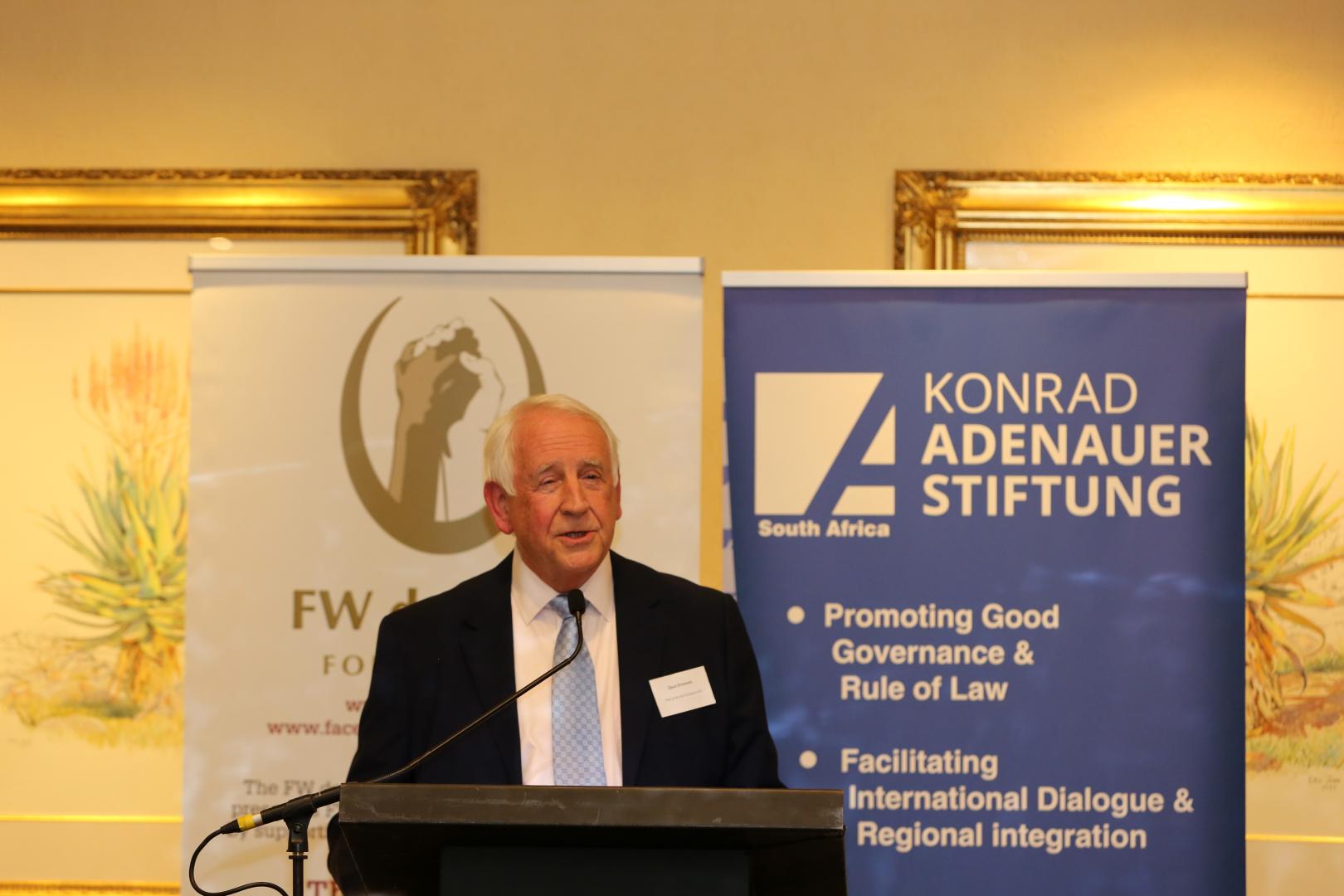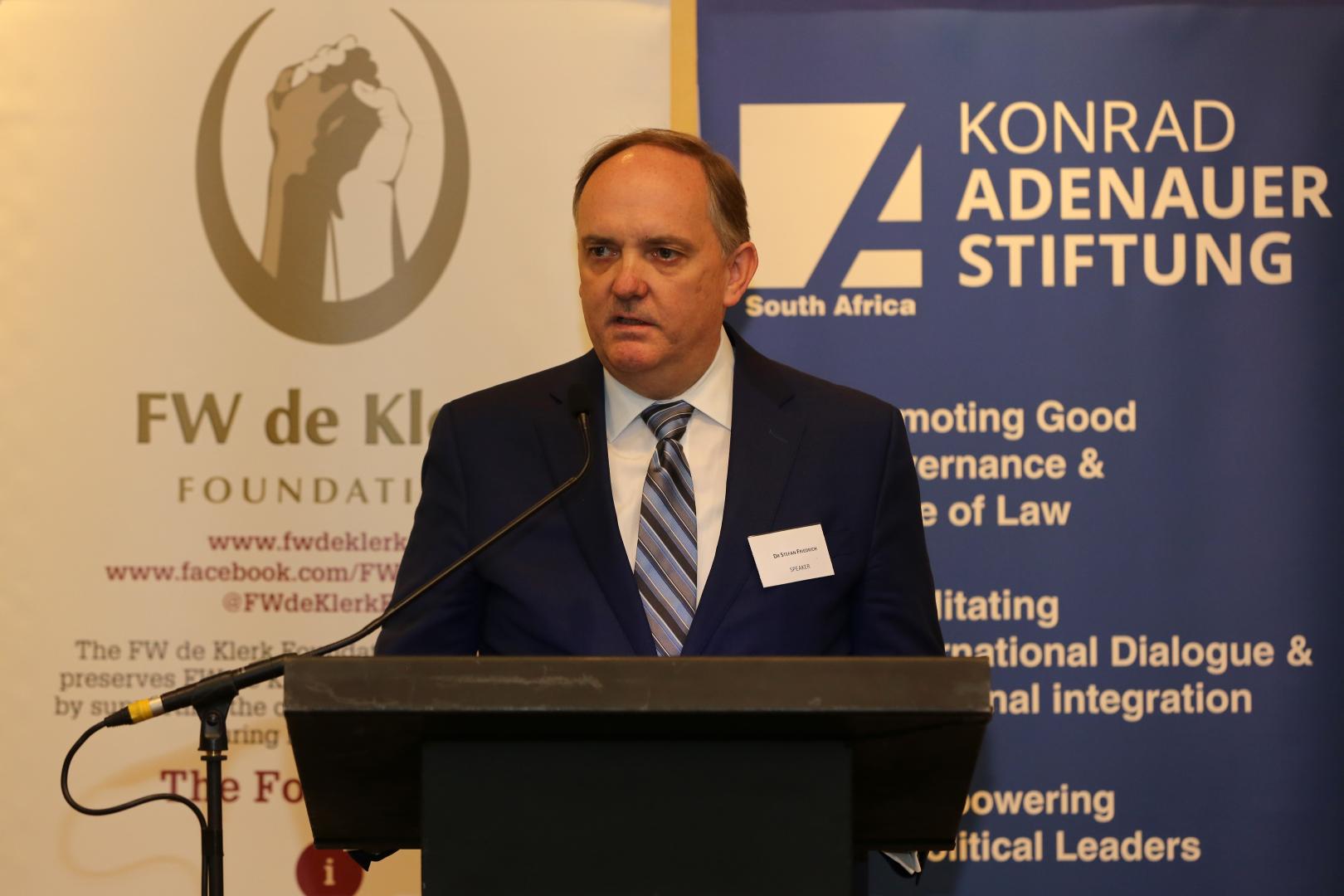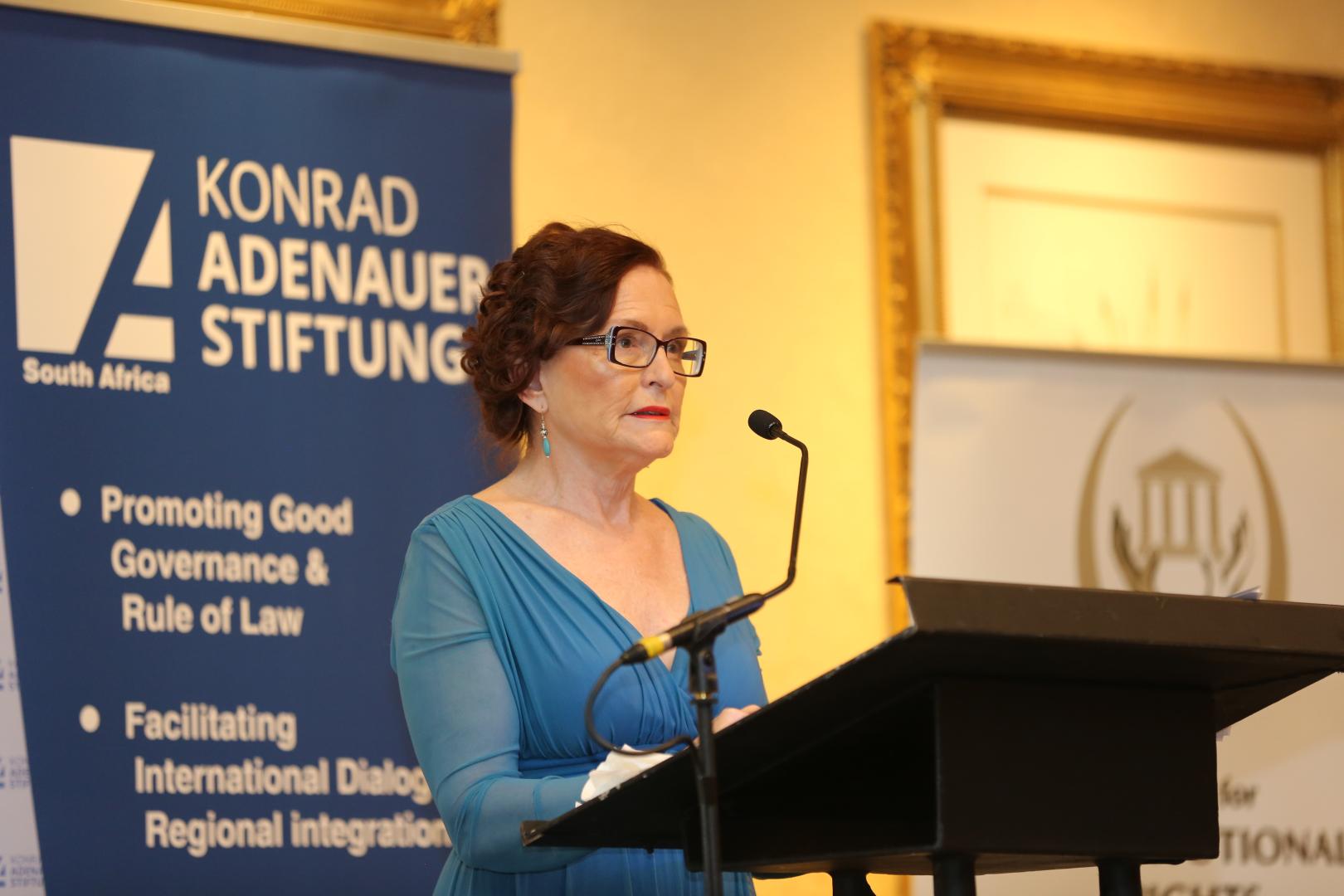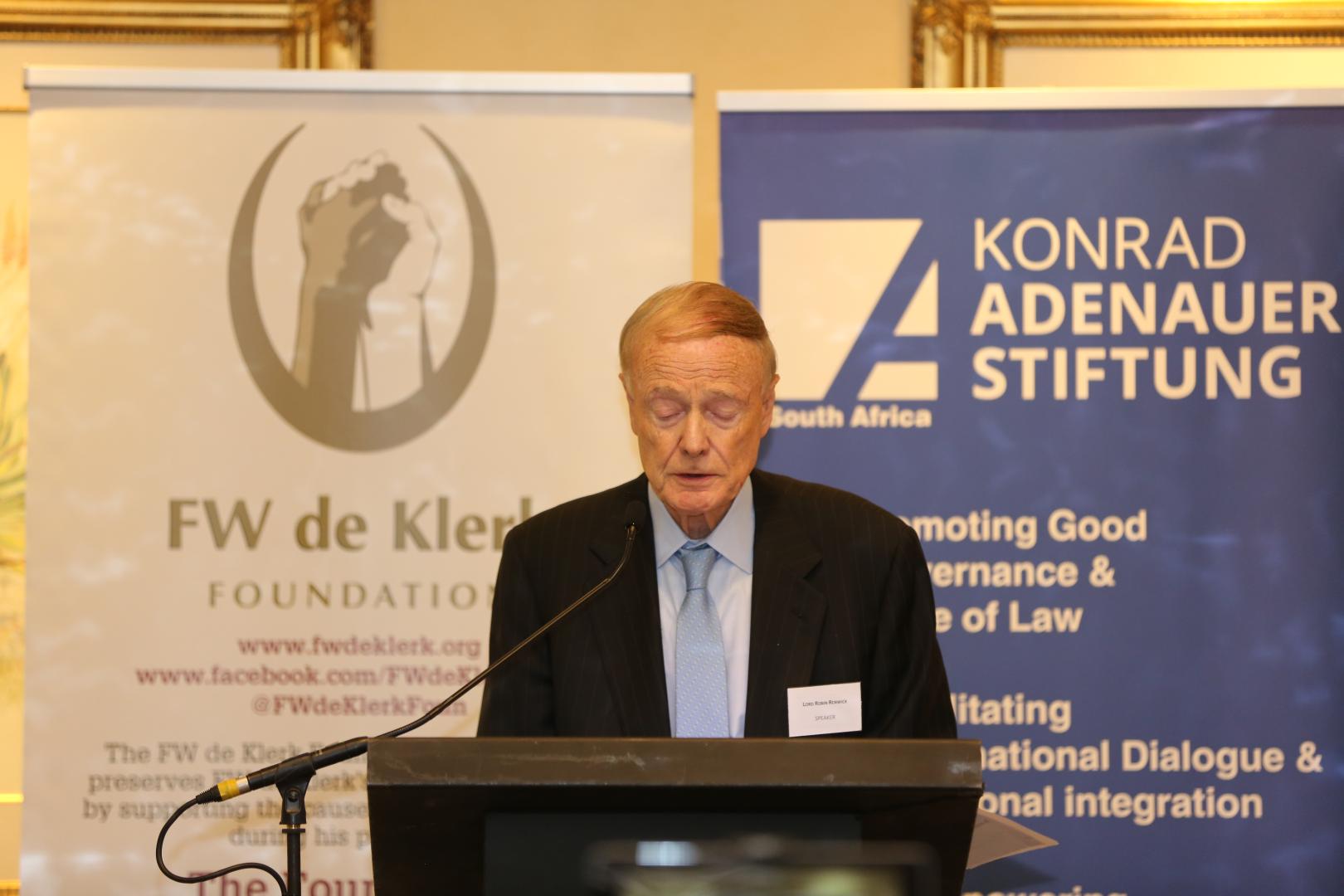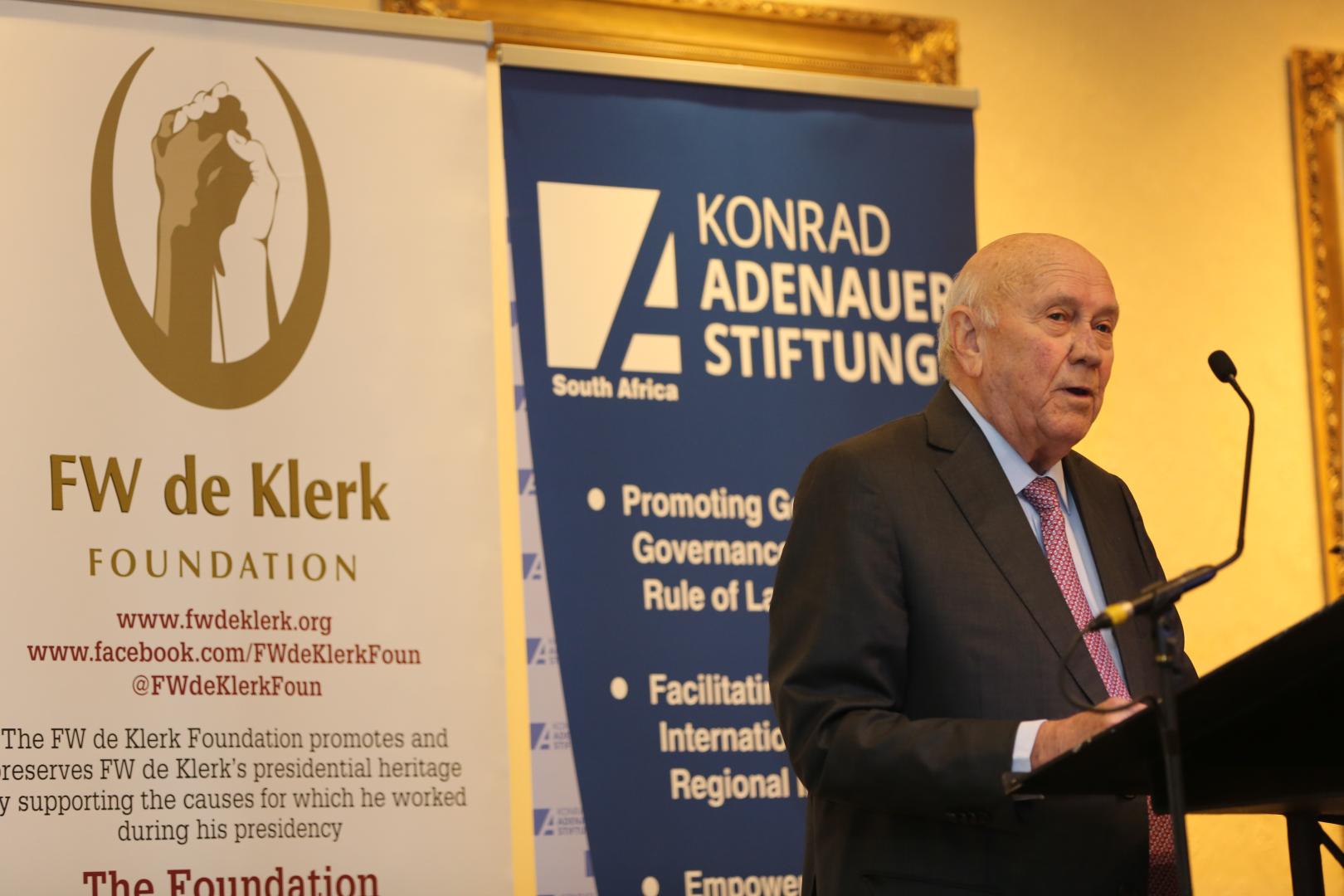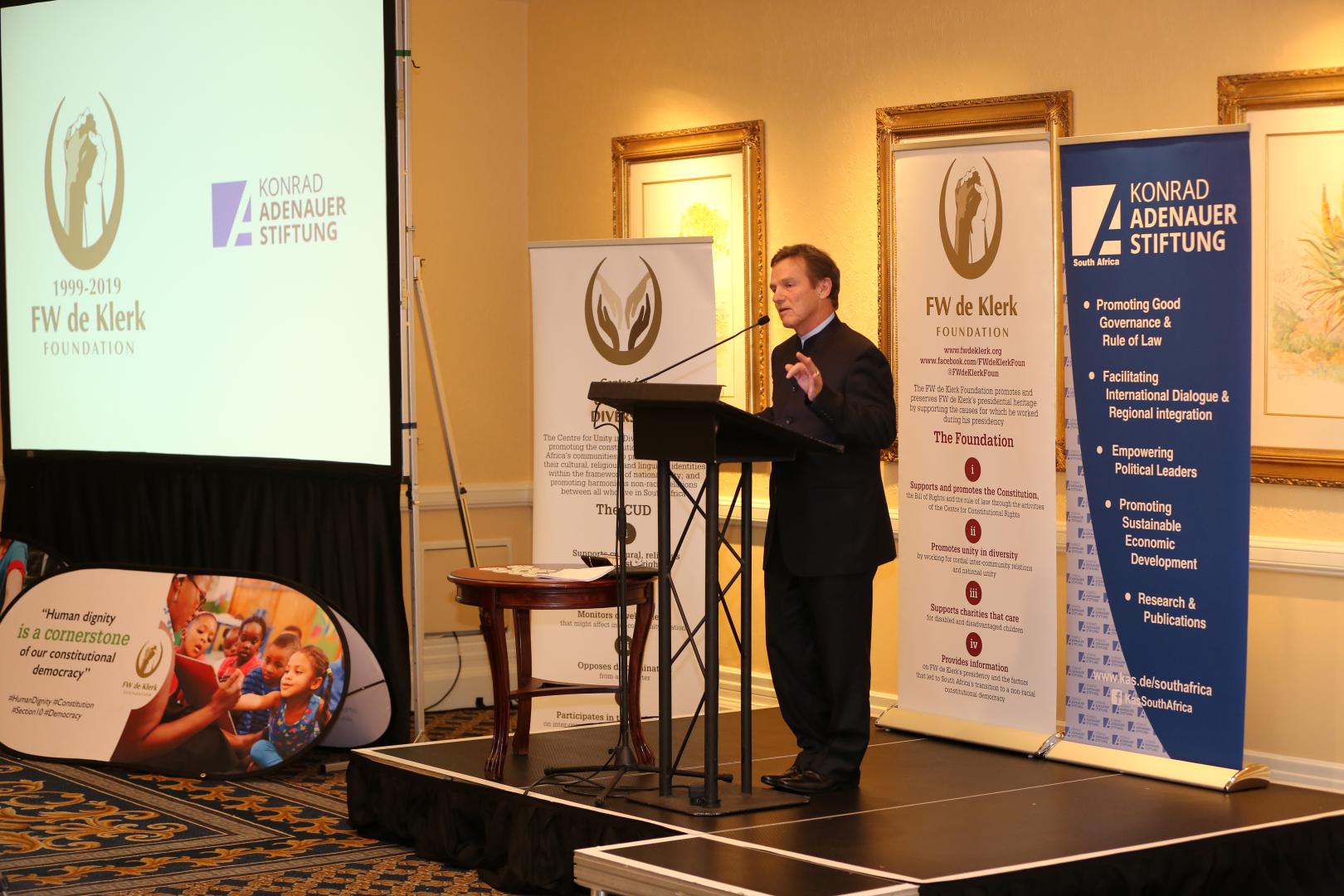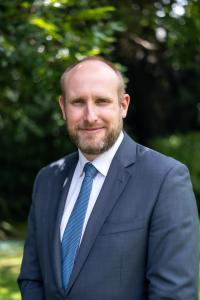Prominent speakers offered both national and international perspectives on South Africa’s constitutional transformation.
Reflections on the Importance of a New Constitutional Order in Times of Transitions
Mr. Dave Steward, the Chairman of the FW de Klerk Foundation, welcomed the guests to the event. Then, first speaker Dr. Stefan Friedrich, KAS Head of Department Sub-Saharan-Africa, used his outside perspective to reflect on South Africa’s path to transformation and the state of democracy. He drew a link to German history, illustrating the German path to a constitutional democracy via the experience of the horrific events of the Second World War. The German constitution was created to remove the underlying causes that made large scale violations of human rights possible. It was meant to serve the people and hence place human dignity at the centre of any political action. By sticking to those ideals, Germany was able to become politically stable as well as to develop economically and socially. When drafting the constitution to end Apartheid, South Africa faced a similar challenge of transforming an undemocratic and unjust society. Constitutionalists like Johann Kriegler and Albie Sachs were able to gain from the German experience by visiting the country and exchanging ideas with experts. South African federalism and the parliamentarian system are elements derived from those exchanges. Dr. Friedrich stressed that both South Africa and Germany managed to transition from diplomatic international isolation to becoming a well respected regional and international voice, being non-permanent seat holders in the UN Security Council. Because of their history, both countries learned that democracy is the only way forward and must guide state decisions. Dr. Friedrich concluded that even though South Africa successfully held its sixth free and fair elections, challenges remain. He thanked the FW de Klerk Foundation for making meaningful contributions in fostering the constitutional order and providing political education and expressed his delight in KAS being able to support these efforts.
South Africa’s Constitutional Transformation: A South Africa Perspective
The second speaker of the evening, Ms. Helen Zille, the former Premier of the Western Cape, gave a critical view on the state of the South African constitutional democracy. She argued that the country must not express complacency with the celebration of the 6th elections without allegations of serious irregularities, as elections may not be sufficient evidence of a functional democracy. In fact, there are plenty of examples in the world in which elections are held, but where the effectiveness of the institutions and the checking and balancing of power is not ensured, and so ultimately, democracy has failed. Because the younger generation loses respect for the achievement of constitutionalism, and because there are more failed transitions to democracy than successes, South Africa should constantly reaffirm its constitutional values. Zille went on to cite the political scientist Francis Fukuyama, who identified three requirements for a stable constitutional democracy. 1) Respect for the rule of law: Zille explained that the law is widely violated across South Africa. This is not only displayed in the high crime rates, but also in the violent politics of protest, which is amplified by the erosion of efficacy of the criminal justice system. With evident cases of corruption, loss of respect for the rule of law is equally present at the highest level of the country’s leadership. 2) A culture of accountability: The prevalence of patronage in South Africa has led to a situation in which people are primarily accountable to a leader rather than the other way around. Zille finds that there is a disjuncture between the traditional accountability systems and constitutional democracy, leading to a misalignment of them, which excludes large parts of the population from the benefits of constitutional checks and balances. 3) The Capable State: Zille continued by linking to the development of an independent capable state in Britain during the 19th Century. The vital factor turning inefficient corrupt public service into a capable impartial state was the examination of civil servants solely on the criteria of merit. With the transition to democracy, South Africa was supposed to achieve these same developments, however, due to the one-party dominance, the ANC was able to dismantle the merit-based system of civil service appointments. Instead, the system of broad representation, in which the public service must represent the make-up of the population in all occupational classes was introduced. A tool that made South Africa vulnerable to becoming this corrupt and criminal state. Zille believes that measured against these three pillars, constitutionalism in the country is not doing well. She argued that these conditions have split the nation in a search for scapegoats. South Africa must hence decide whether it wants the constitution to define the pathway to the future, or if it regards it as the symbol of the past struggle that must be revived. Not only President Ramaphosa but also us, as civil society, the Parliamentary opposition, the media, and the international community will play a crucial role in building a collective mass in defense of the constitution.
South Africa’s Constitutional Transformation: An International Perspective
The next speaker was Lord Robin Renwick of Clifton, the British Ambassador to South Africa from 1987 to 1991. He gave insight on some of his personal experiences as an ambassador, illustrating snippets of conversations and meetings during the period of transformation. He foremost thanked the foundation, and then FW de Klerk in particular for the contribution he has made in South Africa, enabling millions of formerly disenfranchised people to cast their votes for a government. Lord Renwick described the South Africa he arrived to in 1987 as a country in severe repression, isolated and sanctioned from the rest of the world, with no access to international lending, and ultimately on its way to a civil war. The presidency of FW de Klerk was the turning point to this development. Renwick noted that one of his first, often uncredited actions was to voluntarily relinquish South Africa’s nuclear weapons program, making it the first country to do so. Then, unbanning the ANC and releasing Nelson Mandela from prison, de Klerk knew he changed South Africa forever. These changes were brought about, not the victory of one side over another, but by negotiation, compromise and the will of individual actors such as Mandela and de Klerk. Lord Renwick explained how the following phase of economic prosperity was stalled by the lost decade under the rule of Jacob Zuma, which included the looting of billions. So once again, South Africa is in a position where its population growth exceeds its economic growth and in which the outside world and investors turned their back on it. Luckily, with the election of Cyril Ramaphosa, Lord Renwick believes the near-disaster has been prevented. The chance at a Great Escape was only made possible through a South African press willing to expose malfeasance and corruption, through an independent and courageous judiciary, and through the most effective campaign by civil society, in which the FW de Klerk Foundation contributed important parts. Renwick reminded everyone that the Zuma camp is far from dead and buried and that the legacy of low growth still drags on. However, it would be a mistake to be pessimistic about South Africa when it has overcome circumstances far worse than they are today and when it just elected a president who values the Constitution. After all, the path of South Africa has proven that history is made by individuals – either for the better, as in the case of de Klerk and Mandela, or the worse, as by Zuma. Lord Renwick ended his speech with a toast to FW de Klerk, borrowing words of recognition from Mandela: “It was he, who made peace possible”.
Commemorating South Africa’s Constitutional Transformation: Looking to the Future
The last speaker of the evening, the former president and Chairman Emeritus of the foundation, FW de Klerk, elaborated on the process of establishing the constitutional democracy in his speech. He commenced by describing the situation in South Africa in the mid-1980s as desperate, with an economic crisis, international diplomatic isolation, and the violent uprisings across the country. The turning point came towards the end of the decade with the collapse of the Soviet Union, the new openness to negotiations of the ANC, and the successful installment of a democratic constitution in Namibia. De Klerk explained how he realized that the circumstances for constitutional negotiations would never again be so favorable, leading him to unban the ANC and start the process of transformation. He depicted this process as a roller coaster ride featuring many crises, that were, however eventually overcome in December of 1993 with an agreement on an Interim Constitution. This constitution, considered South Africa’s biggest achievement, was the base of all progress made in the last 25 years, including the end of apartheid, the establishment of a functioning multi-party democracy, independent courts and free media, and the returning as a full member of the international community. Furthermore, this transformation, regarded as a miracle, would serve as a symbol that even the most intractable problems can be solved peacefully. De Klerk then went on to reflect on the establishment of the FW de Klerk Foundation in 1999 aimed at upholding the core elements of this great national accord. The foundation thus focused its efforts firstly on defending the Constitution, secondly on supporting provisions that defend the rights of minorities and thirdly on promoting positive inter-community relations. De Klerk then displayed the contributions the foundation was able to make as he listed a number of successes throughout the foundation’s 20-year-old history. He also revealed that the foundation has decided to adopt an additional goal: the commemoration and celebration of South Africa’s constitutional transformation, realized through a documentation and education center. De Klerk ended his speech with = the conclusion that due to history, being South African means that there is no room for political complacency – being South African means that there is a constant process of introspection and search for paths out of the impasses the country is confronted with. Hence he and the foundation will continue to promote constitutional values while keeping the memory of South Africa’s greatest achievement alive.
The closing comments of the evening were made by Dr. Theuns Eloff, Chair of the Foundation’s Board of Advisors. He thanked the audience, partners and the speakers and pointed out that while much has been achieved, more lies ahead. Therefore the FW de Klerk Foundation will continue to serve in its role as a voice of reason and balance in South Africa.


